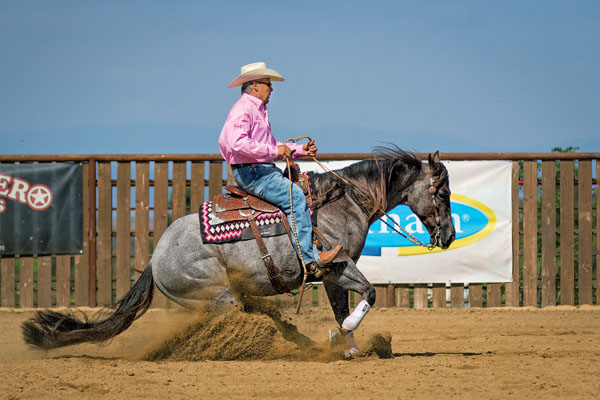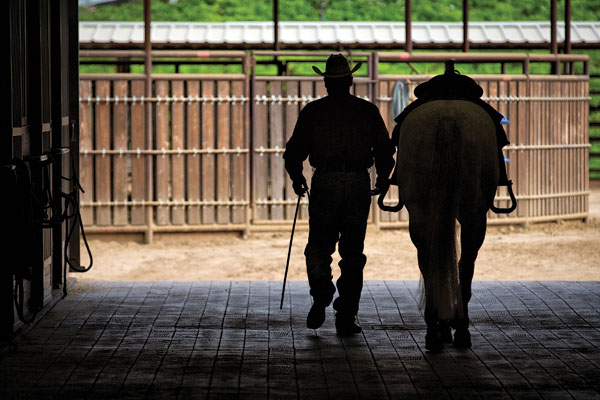World-class trainer Matlock Rose used to say that horse shows are designed to show how hard you work at home. That includes how you care for, train, and prepare your horse. Is your horse fit and in good shape, both mentally and physically? Your answer will give you a clue as to how you’ll get through your next show.
[READ: Avila’s Secrets for Senior Performance Horses]

Here’s a five-question quiz to test your horse-show maintenance program, both at home and at an event. I’ll explain my answers, along with the pitfalls of going against them, so you can do right by your horse in his preparation before and care at an event.
For the best results, I do most of my training:
• At home.
• At the horse show.
I can tell which riders are doing most of their training at the horse show—they’re the ones at the vet truck and have the most problems in the pen.
When I pull my rig out of the driveway, I want to feel like I’m 100-percent ready, from them being clipped and bathed to ready to compete. You don’t wake up the morning of a marathon and decide to go run it. You have to prepare to be a winner. Horses are the same way.
We ride harder at home than we do at the show. When we get to an event, our horses almost feel like they’re on vacation. Pushing a horse at home builds his mental and physical stamina that he’ll need under the stresses of a big show. These include riding at odd hours—showing at 10:30 at night or schooling at 4 in the morning—stalling under different light than at home, and adapting to footing, for example.
When I travel across time zones for shows, I:
• Feed at the same time on the clock as I would at home.
• Stick with my home time zone, feeding earlier or later on the clock accordingly.
• Do whatever I can—I’m at a horse show, and things get a little crazy.
No matter how far I am from home or how many time zones I’ve crossed, I keep my horses’ feeding schedule as close to their at-home routine as possible. Horses are creatures of habit, and messing with their routines can lead to health problems, as well as shake their confidence.
[MORE WITH AVILA: Say ‘NO’ to Negativity]
We feed at 6:30 in the morning and at 3:30 in the afternoon when we’re at home. So when we travel to the Mountain time zone, we feed around 7 a.m. and 4 p.m., depending on the show schedule. It’s harder when we go to the Central time zone, but we do our best to stick to what our horses know and expect. The more you change the routine, the harder it is for the horse.
I’d describe my attention to my horse at an event as:
• I’m a helicopter parent—I watch him like a hawk, noting every sip of water, sniffle of his nose, and pile dropped in the corner.
• I’m a free-range parent—I’m about as laid back as it gets, and I’m sure my horse will let me know if something is really wrong.

I check my horses every evening when I’m at home. I note their attitudes, how they’re eating, and if anything seems off. So it’s not unusual for me to check them at least once in the evening at a show. We hand-water at events, so I always check to see if the horses are drinking and if they have enough water to get through the night. Additionally, if I have to buy new feed or hay, I’m mindful of how those changes can influence a horse’s presentation and problems they can cause. Keeping a close watch on your horse’s well being at a show is responsible horsemanship. Without that, you won’t have a horse to show.
My vaccination and scheduled health program is typically:
• Set out on a calendar at the start of the year, so I can adjust around shows when I need to.
• A last-minute, panicked call to the vet to get my horse vaccinated, usually past when he’s due.
We travel to the Arizona shows at the beginning of a year, so we always vaccinate in January. This allows us to set a course for preventative care for the entire year, and the horses are freshly vaccinated before we hit the road for a few weeks of competing. Our horses’ immune systems are at their best to fend off whatever viruses or bacteria might linger in their stalls, as well as to withstand wee-hours workouts and unpredictable weather changes.
When I take multiple horses to an event, I:
• Treat them all the same—from the time we load up at the barn to when we leave the grounds to return home, treating them all the same keeps my head on straight.
• Treat them individually—they each have special needs before, during, and after the show, and I accommodate them.
In my barn, every horse is an individual. We’re well acquainted with each of their personal needs, and we try to accommodate them. This helps keep them healthy, sound, and ready to give us their all at a show. For example, the farrier comes to our barn on Mondays. If we leave for a show on a Saturday, we make sure that none of them will hit the six-week mark when we’re on the road. We have one horse that gets sensitive and a little sore three days after being shod, so we make sure to time his appointment with the farrier accordingly, so he can get past his soreness before we leave. It takes planning, but it’s worth the effort.
Because we expect so much of our horses at an event, it’s only fair that we give them every shot to succeed by providing the best care that we can.
When I get home from an event, I:
• Turn my horse out for some rest and relaxation.
• Apply what I learned at the show, and start schooling right away for the next competition.
After a long show, we give our horses five or six days off. It lets them decompress and keeps them from resenting training and showing. If you get home and go right to drilling, you’ll increase the risk of injury, sour your horse toward training, and fry his brain. You and your horse can both use a break before you get back to business.
A multiple AQHA world champion, Avila has also won three NRCHA Snaffle Bit Futurities, the NRHA Futurity, and two World’s Greatest Horseman titles. He received the AQHA Professional Horseman of the Year honor. His Avila Training Stables, Inc., is in Temecula, California. Learn more at bobavila.net.

